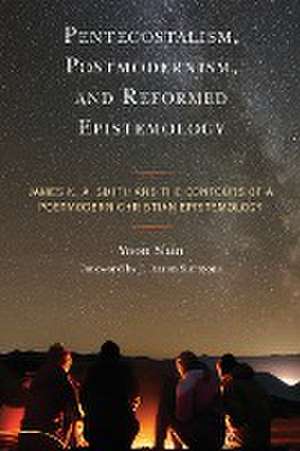Pentecostalism, Postmodernism, and Reformed Epistemology
Autor Yoon Shinen Limba Engleză Paperback – 22 aug 2023
| Toate formatele și edițiile | Preț | Express |
|---|---|---|
| Paperback (1) | 312.01 lei 6-8 săpt. | |
| Globe Pequot Publishing Group Inc/Bloomsbury – 22 aug 2023 | 312.01 lei 6-8 săpt. | |
| Hardback (1) | 687.32 lei 6-8 săpt. | |
| Rowman & Littlefield – 14 noi 2021 | 687.32 lei 6-8 săpt. |
Preț: 312.01 lei
Nou
Puncte Express: 468
Preț estimativ în valută:
59.71€ • 61.68$ • 49.69£
59.71€ • 61.68$ • 49.69£
Carte tipărită la comandă
Livrare economică 25 martie-08 aprilie
Preluare comenzi: 021 569.72.76
Specificații
ISBN-13: 9781793638762
ISBN-10: 1793638764
Pagini: 270
Dimensiuni: 152 x 229 x 16 mm
Greutate: 0.4 kg
Editura: Globe Pequot Publishing Group Inc/Bloomsbury
ISBN-10: 1793638764
Pagini: 270
Dimensiuni: 152 x 229 x 16 mm
Greutate: 0.4 kg
Editura: Globe Pequot Publishing Group Inc/Bloomsbury
Cuprins
Foreword
Acknowledgements
Introduction
Part 1: Smith¿s Pentecostal Epistemology
Chapter 1: Pentecostal Spirituality and Postmodernism
Chapter 2: Pentecostal Epistemology
Chapter 3: Pretheory, Theory, and Their Integrated Relationship
Part 2: Smith¿s Postmodern Epistemology
Chapter 4: Postmodern Hermeneutic Epistemology
Chapter 5: Smith the Relativist?
Chapter 6: Against Narrative, Affective Knowledge
Part 3: Reformed and Postmodern Epistemology
Chapter 7: Plantingäs Reformed Epistemology
Chapter 8: Warranted Christian Belief
Chapter 9: Reformed Epistemology, Postmodernism, and a Way Forward
Conclusion: Contours of a Postmodern Christian Epistemology
Glossary
Bibliography
Index
About the Author
Acknowledgements
Introduction
Part 1: Smith¿s Pentecostal Epistemology
Chapter 1: Pentecostal Spirituality and Postmodernism
Chapter 2: Pentecostal Epistemology
Chapter 3: Pretheory, Theory, and Their Integrated Relationship
Part 2: Smith¿s Postmodern Epistemology
Chapter 4: Postmodern Hermeneutic Epistemology
Chapter 5: Smith the Relativist?
Chapter 6: Against Narrative, Affective Knowledge
Part 3: Reformed and Postmodern Epistemology
Chapter 7: Plantingäs Reformed Epistemology
Chapter 8: Warranted Christian Belief
Chapter 9: Reformed Epistemology, Postmodernism, and a Way Forward
Conclusion: Contours of a Postmodern Christian Epistemology
Glossary
Bibliography
Index
About the Author
Notă biografică
Descriere
Descriere de la o altă ediție sau format:
This work critically builds on James K. A. Smith's postmodern Pentecostal epistemology with the aid of Reformed epistemology. The resulting postmodern Christian epistemology retains the central postmodern characteristics of perspectivalism and embodiment while integrating the truth element of Reformed epistemology's warrant criteria.
This work critically builds on James K. A. Smith's postmodern Pentecostal epistemology with the aid of Reformed epistemology. The resulting postmodern Christian epistemology retains the central postmodern characteristics of perspectivalism and embodiment while integrating the truth element of Reformed epistemology's warrant criteria.
